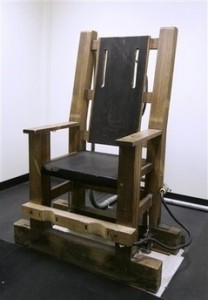DALLAS, TX – For the third time this week a Texas execution was canceled due to the prison inmate #474901’s NPO status. “Someone’s got to get their act together over there as this is the fifth time this month that those executions have been canceled,” local resident Marlene Gibbons told reporters.

Executions in Texas have gone through a rough patch recently: in November they were indefinitely delayed due to the shortage of alcohol swabs used to sterilize the inmate’s skin right before an IV is placed.
“We can’t be placing IVs without the proper sterilization of the skin,” said prison health worker Kevin Fitz. If workers are unable to start an IV, only firing squad and electric chair executions are available, but unfortunately both are illegal in Texas.
Due to a newly-discovered Texas law from 1873, “Anyone about to be executed is allowed a ‘Last Meal’ at a minimum of two hours prior to execution.”
Typically NPO status violations in hospitals occurs when a patient will get breakfast by mistake before their surgery. The surgery will be delayed eight hours so when the patient undergoes general anesthesia, they don’t aspirate and get placed on a ventilator in the ICU with aspiration pneumonia.
Inmates on death row will go under general anesthesia with high doses of propofol before they are executed. Currently, as the law stands, the only way for the execution to go forward is for the inmate to refuse their “last meal.” There is no such thing as an emergent execution and according to the American Society of Anesthesia (ASA), you must wait 8 hours before general anesthesia. Therefore an inmate may grow old on death row eating only their favorite foods.

ASA spokesman, Dr. Anthony Wilkenson, had this to say about the official ASA stance. “Anesthetizing a patient with a full stomach before 8 hours has elapsed would be considered malpractice. We must adhere to theses strict rules.”
Texas is currently trying to create an anesthesia-free zone, or AFZ, in prisons so the rules of anesthesia do not apply. Surgeons are hoping to apply AFZ standards throughout operating rooms in the US in the near future.
“Those guys always find ways to delay cases,” said general surgeon Hanz Dusterson. “I would love to operate in an anesthesia free zone, but unfortunately we still need them to give medicines and whatever else they do behind that blue curtain.”







